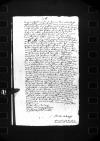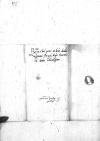 AAWO, AB, D. 19, No. 46_1
AAWO, AB, D. 19, No. 46_1
Reverendissime in Christo Pater et Domine, domine colendissime.
Officiosissimam servitutis meae commendationem.
Causa ⌊pupilli⌋, non possum nisi quod sentio dicere, mihi et iusta, et aequa videtur atque eiusmodi, ut prorsus nihil habere scrupuli videatur. Atque in eadem est sententia reverendissimus ⌊dominus meus Plocensis⌋, sed secus visum est aliis, qui remittendam istuc omnino censebant. Itaque remissa est, cum causa, quamobrem remitteretur, nulla esset.
Villam Selestri ⌊reverendissimus dominus⌋ pro fratre Reverendissimae Dominationis Vestrae impetravit; litteras mitto. De morte ⌊reginae⌋ iam pridem istuc allatum est procul dubio. Erepta est nobis malis bona ⌊regina⌋. Non eramus digni, qui talem haberemus, Deus ⌊illius⌋ animae sit propitius. Ingens sui desiderium apud omnes reliquit.
Scripsit cardinalis Cortesius ad ⌊doctorem Andream⌋ esse proscriptum a regno virum bonum, cuius istic doctrina sit admirationi, ⌊Alexandrum Sculteti⌋. Rogat, ut pro ea auctoritate, qua plurimum hic valet, ⌊eum⌋ curet liberandum aut saltem fidei litteras impetret, ut purgare illi se apud ⌊maiestatem regiam⌋ liceat. Egit ⌊is ⌋cum ⌊reverendissimo domino⌋, quandoquidem opinio est hominum in ⌊Italia⌋, esse eum hic summa auctoritate, ut hanc opinionem confirmare sibi liceat impetratis ⌊Alexandro⌋ fidei litteris. Respondit ⌊reverendissimus dominus⌋: gravium criminum eum esse accusatum, neque fas esse dari ⌊illi⌋ eius generis litteras, nisi sciente et consentiente Reverendissima Dominatione Vestra; prius ⌊illi⌋ esse placandam Reverendissimam Dominationem Vestram, deinde id petendum. Viderit iam Reverendissima Dominatio Vestra, quid respondeat. Contendet ⌊ille⌋ nervos omnes procul dubio, ut quod obtinere non potuit orator pontificis, qui nunc est ⌊cardinalis Augustanus⌋, id ipse manea(?) obtineat et auctoritatem suam ostentet. Plura in ista occupationum mole scribere non licet. Sunt hic perpetua comitia.
Deum precor, ut Reverendissimam Dominationem Vestram diu servet incolumem. Cuius gratiae me commendo.


 AAWO, AB, D. 19, No. 46_2
AAWO, AB, D. 19, No. 46_2